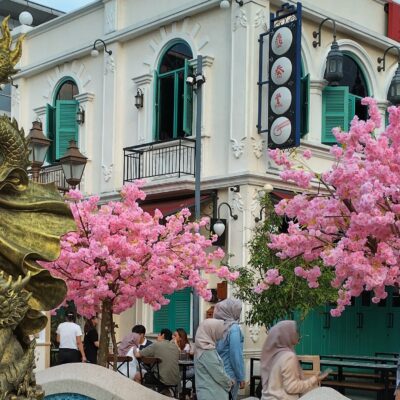On March 8, 2022, dozens of Indonesian contract farmers gathered in front of the local parliament building at Sintang, West Kalimantan, to protest against three palm oil companies. These contract farmers, also known as ‘plasma smallholders’, work under a scheme with a company which sends field workers to plant on the farmers’ land in return for part of the harvest.
Along with two Indonesian companies, the Chinese company PT Julong Group Indonesia was accused of disbursing a concession fee that the contract farmers claimed to be too low and not reflective of the rising price of palm fruit. Julong was also accused of land grabbing—taking over local land illegally for palm oil cultivation.
In response, the leader of the local parliament visited the land under dispute, along with hundreds of contract farmers, but Julong was absent. To press for a response, the protesters besieged the company’s office, which further escalated to blocking the road to the company’s complex. The conflict lasted for 12 days and ended only after the local parliamentarians held closed-door mediation.
This series of events form the largest protests against Julong in recent years. Despite the company’s presence in Indonesia for more than a decade, Julong often still struggles with community discord over its sustainability practices. This is in sharp contrast to how Julong is presented by Chinese sources as a role model among China’s ‘going-out’ enterprises (companies which invest in foreign nations).
Drawing on our ongoing study of Julong and other evidence, we consider both the context for China’s presence in Indonesia’s palm oil sector and different stakeholder views on Julong’s sustainability practices. In doing so, we aim to reflect on the particular challenges associated with China’s palm oil business in Indonesia, for both China’s ‘going-out’ enterprises and Indonesia’s palm oil sector.
China’s presence in Indonesia’s palm oil production
Palm oil is an edible vegetable oil with many different properties and functions. According to WWF-UK, it is present in close to 50 percent of packaged products in supermarkets, ranging from food including pizza, doughnuts and chocolate, to personal care items such as deodorant, shampoo, toothpaste and lipstick. Indonesia is the world’s largest supplier of palm oil: in 2017, the country alone produced almost 50 percent of global supply. Around two-thirds of the Indonesia-produced palm oil is exported, with major international buyers including India, China, and Europe.
Despite its economic significance, or perhaps because of it, Indonesia’s palm oil sector has been highly contentious given its profound adverse environmental and social impacts in some circumstances. The production of palm oil has resulted in major deforestation of Indonesia’s peat swamp forests—the native habitats of endangered species such as orangutans and also one of the world’s most important ecosystems. Conversion of these forests to palm oil plantations frequently causes forest fires and massive greenhouse gas emissions from the carbon rich peatlands, contributing to climate change. Socially, land-related conflicts with local and indigenous communities have been pervasive. There are also issues related to the exploitation of workers, including children.
China is the world’s second largest importer of palm oil after India. Given various serious constraints on producing palm oil domestically, China has been entirely dependent on imports. Establishing palm oil operations overseas has thus been a way to directly control production, which has been driven by a national imperative to secure food supply and gain more leverage over international pricing.
On the Indonesian side, China’s demand for palm oil is welcome, especially due to dwindling demand from Europe. In 2018, the European Union introduced a ban on palm oil biofuels (effective from 2021). Soon after, during a visit to Indonesia by China’s Premier Li Keqiang in 2018, Indonesia’s President Joko Widodo (Jokowi) and Li specifically discussed and agreed to increase China’s palm oil imports from Indonesia.
Julong as China’s ‘exemplar’
Established in 1993 in Tianjin, China, Julong is a privately-owned enterprise which started as a small grain oil shop and then focused on palm oil related businesses. It is now the largest palm oil player in China, contributing to 22 percent of total trade volume. In 2006, following the Chinese government’s call for ‘going out’, Julong officially launched its first foreign investment in Indonesia’s palm oil plantation.
Today, the Julong Group owns 11 palm oil plantations in Indonesia (mainly in Kalimantan), with a total area of nearly 200,000 hectares. Julong has also expanded to palm oil processing and logistics businesses in multiple sites in Indonesia, and owns three crushing mills, two river port logistics warehousing bases, and several other plants under construction.
Julong’s presence in Indonesia has received high-level government recognition from the China side. In particular, the China-Indonesia Julong Agricultural Industry Cooperation Zone—a project led by Julong in collaboration with its partners—was among the Belt and Road initiatives signed by presidents from both sides during a visit by China’s President Xi Jinping’s to Indonesia in 2013 and also during Jokowi’s visit to China in 2015.
Within China, Julong has been promoted as an exemplar among the ‘going out’ enterprises. The Group has received extensive media coverage (e.g., Xinhua, CCTV) on its sustainability practices; and it was listed as a successful case study in the 2017 Sustainable Development Report on Chinese Overseas Enterprises, jointly published by China’s Ministry of Commerce, State Council, and the China Office of United Nations Development Programme. Julong was also ranked as the first among 99 of China’s Belt and Road Initiative industrial parks, according to a 2020 study by China’s Energy Foundation and the China Energy Research Society.
These appraisals have emphasised Julong’s work creating employment, sharing profits with smallholder farmers through the plasma scheme (termed as a ‘cooperative planting’ model in Chinese), increasing local people’s income, and improving local infrastructure.
Poor performance in the eyes of NGOs
These overwhelmingly positive reports on Julong in China sit in stark contrast with its low ranking among local Indonesian and international Non-Governmental Organisations (NGOs). In 2017, Julong’s membership of the Roundtable on Sustainable Palm Oil—the international organisation promoting the growth and use of sustainable palm oil—was terminated after the company failed to submit its Annual Communications of Progress for three consecutive years.
Julong is also poorly rated by Greenpeace in terms of forest protection and fire control. In Greenpeace’s 2021 report on illegal palm oil in Indonesia’s forests, Julong was listed as one of the top 25 producer groups with the largest palm area inside forests. In a 2019 report on Indonesia’s fires, Julong was identified by Greenpeace as one of the groups with the highest number of fire alerts/‘hotspots’ (as derived from satellite sensors), responsible for burning 6,800 hectares of land between 2015 and 2018.
Another major criticism of Julong relates to its lack of transparency. On an online platform called SPOTT, developed by the international conservation charity Zoological Society of London, Julong is ranked as one of the lowest on their Palm Oil Environmental, Social, and Governance policy transparency assessments: it had a total score of 1.1 out of 100, and ranked 93rd out of 100 selected companies in the 2021 annual review.
Ambivalent local attitudes about Julong
During the conflict described earlier, the plasma-smallholder protestors raised 17 demands, mostly calling for Julong to share more of their business revenues/profits with them. This included not only increasing the concession fee, but also involving plasma smallholders in Julong’s business operations (as opposed to keeping to a transaction-based relationship only) and hiring more local people (instead of foreigners and/or Indonesians from other parts of Indonesia) as either field workers or managers.
In addition, a key issue raised during the conflict was Julong’s corporate social responsibility (CSR). Commenting on the protests, local parliamentarians suggest that the problem is that Julong has failed to deliver CSR programs that bring positive, substantial impacts to the local society. In elaborating on their expectations, one stated:
‘CSR is mandated by law and thus must be delivered. Companies [including Julong] must be sensitive to what the community needs and try to help them, such as by repairing roads, helping with worship facilities, providing educational assistance and other social assistance.’
Local dissatisfaction with Julong was also manifested in a conflict at Sintang in 2019. Similar to the more recent episode, a number of villagers barricaded the access road to one of Julong’s estates, accusing the company of delaying the conversion of their plots for planting, which was agreed in 2007. The long delay made Julong the sole beneficiary of the plots and prevented the plasma smallholders from sharing any benefit. Again, the villagers attributed their discontent to the absence of CSR programs from Julong. As one village head complained:
‘They [Julong] take all the harvest from plasma smallholders but has never delivered any CSR.’
The complaints against Julong are not uncommon in Indonesian’s palm oil sector. Such grievances or protests may also target Indonesian or other foreign companies, and frequently, the overarching goal is to press for a redistribution of wealth ‘so that the companies extracted less and gave more’. To contextualise the local discontent, various local stakeholders during our fieldwork share the view that, within Indonesian rural communities, those members with considerable wealth—especially a large company like Julong—are expected to contribute to the well-being of local people and share their revenues/profits broadly. This is particularly true in less developed areas such as Sintang as local governments tend to struggle to deliver even basic public services. The locals may thus turn to the perceived wealth of Julong to take up social responsibilities ranging from building roads, providing scholarships, to initiating other schemes to benefit the local people.
The legal protections around these expectations are generally weak. Indonesia’s Plantation Law only vaguely requires state-owned and private companies to provide benefits to the local population, and the Investment Law, while including a provision on CSR, does not include specific regulations or standards on what corporations must accomplish. These ambiguities thus open a vast space for interpretation and negotiation between a company and various local stakeholders.
Indeed, our fieldwork indicates that the demands raised in the recent demonstration are controversial on the ground. In fact, Julong only has a dozen employees with a Chinese background among more than a thousand staff members in Sintang. The overwhelming majority of Julong employees are non-locals from other areas of Indonesia but this appears to be more driven by a general lack of attractiveness of palm oil field worker jobs, which offer relatively low income but require longer work hours when compared to rubber planting, which remains the most popular option among locals in Sintang.
Also, while Julong has been repeatedly accused in media reports of ‘failing’ to deliver CSR, it was presented with a CSR Award by the Sintang government in 2021 to recognise the company’s efforts to help with two major disasters. In December 2020, Julong donated COVID-19 PCR (Polymerase Chain Reaction) test kits to the government. Following a heavy flood in November 2021, Julong provided 300 food packages for affected locals. The company also funded a road upgrade project in a small but vital piece of road, making it flood-resistant, thereby facilitating inter-village connectivity. Clearly, however, while these efforts seemed applaudable to Julong and the Sintang government, many in the local community considered these efforts as insubstantial in terms of contributing to local people’s livelihood.
Challenges for China’s ‘going-out’ enterprises and Indonesia’s future development of the palm oil sector
At the macro level, despite the socio-environmental concerns around Indonesia’s palm oil industry, China’s presence has been strategic and welcomed by both sides. In this context, Julong’s entry to Indonesia has received high-level government recognition and the company has been portrayed as particularly laudable among China’s ‘going out’ enterprises, especially for providing employment and improving infrastructure. The greatest criticism of Julong has come from international NGOs, targeting the company’s poor performance in forest protection and fire control, and lack of transparency. At a local level, Julong’s profit sharing with plasma smallholders and CSR efforts have been the focus point of disputes in Sintang. While plasma smallholders and some local parliamentarians have voiced concern about what they see as a lack of CSR, there are loose legal requirements on companies such as Julong in terms of CSR, despite the high needs and expectations of locals. On the other hand, Julong’s CSR efforts have received recognition from the local government, particularly for helping out in disasters.
The contrasting viewpoints on Julong’s operations in Indonesia are rooted in vastly different priorities and interpretations across stakeholders. The socio-environmental challenges are thus deeply political, i.e. whose view is important?
While the pressure from NGOs and various local groups (plasma smallholders, parliamentarians, etc.) is also faced by Indonesian or other foreign companies, a particular challenge for a Chinese company relates to the differences between operating in China and outside it. As Julong’s Public Relations executive officer explained:
‘In case of land acquisition, there is a very large gap between the local [Indonesian] customs and those in China. After the [Indonesian] local government sells the land to you, they will wash their hands off the matter, leaving all the rest things to be handled by yourself, including the compensation and communication with villagers [while the government in China would be directly involved in negotiating with villagers]…conflicts were common, the roads were frequently blocked, and some even took the gun and machetes to come to our location.’
The critical challenge for Julong has been to learn how to directly interact with the various stakeholders in a foreign context with limited experience, since the Chinese Government assumes a very assertive role. The company has clearly recognised this challenge and in response has established a ‘environment division’, a public relations department responsible for communicating with various stakeholders. However, from the recent conflict and Julong’s rather passive response at the Sintang site, it seems there is still a long way to go for Julong to effectively negotiate with various local stakeholders, not only the government.
From the Indonesian perspective, dealing with Julong and other Chinese palm oil players more generally also comes with its own issues. Most notably, as companies like Julong primarily serve the Chinese market, there is significantly less market and home country pressure on the company (especially when compared to a counterpart serving a Western market) to uphold NGOs’/Western sustainability standards. Another key factor is a countering discourse created within China, where companies like Julong may already be considered leaders in terms of sustainability practices, based on a different set of priorities and criteria. These critical contexts provide important explanation as to why Julong can almost ignore its poor rankings among NGOs.
However, this doesn’t mean that Chinese companies can freely practice sustainability the Chinese way. As the conflict at Sintang shows, local players may demonstrate their agency through powerful means including protesting and appealing to local parliamentarians, directly interrupting Julong’s operations, and amplifying their voices through local media. This makes it almost impossible for Julong to completely neglect local demands, especially given the company’s heavy reliance on local resources including land and labour. From this perspective, the sustainability practices of Chinese companies are not determined by the Chinese side alone, but co-evolve in contexts within their host society. As such, the challenges introduced by China’s influence in Indonesia’s palm oil sector are also not one-sided and constant but are shaped by shared understandings of appropriateness and evolve over time.
Authors: Dr Xiao Tan & Dr Ardhitya Eduard Yeremia
Image: Palm fruit/ Credit: Nafise Motlaq, World Bank/Flickr




